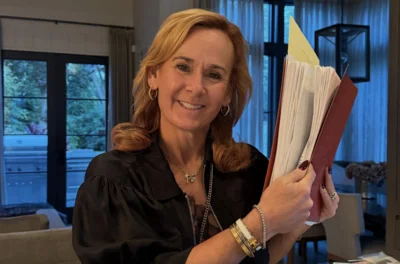Illinois Gov. Bruce Rauner delivered his State of the State message Wednesday.
Illinois Gov. Bruce Rauner delivered his State of the State message Wednesday.
As Gov. Bruce Rauner tackled key financial issues affecting Illinois -- including the ongoing budget stalemate -- in his second State of the State address on Wednesday, the Republican candidate for the House seat in District 84 cited the budget gridlock as a clear reason why term limits for elected officials need to be enacted
Rauner urged the legislature to set party politics aside and work together to finalize Illinois’ budget, saying it’s not too late to make “historic progress.”
“If each of us commits to serious negotiation based on mutual respect for our co-equal branches of government, there’s not a doubt in my mind we can come together to pass a balanced budget alongside reforms,” Rauner said. “If we work together, Illinois can be both compassionate and competitive.”
Mike Strick, District 84 candidate for the House seat, sees the budget impasse as a game of politics.
“It is starting to hurt a lot of people, but I believe it is a political football by Mr. (House Speaker Mike) Madigan and Mr. (Senate President John) Cullerton,” Strick told the DuPage Policy Journal. “These men have been in control of their respective houses for 30 years, I believe in term limits and you get more representative government if you get more change in the system.”
Meanwhile, District 84 Democrat incumbent Rep. Stephanie Kifowit told the DuPage Policy Journal she didn’t hear Rauner make any suggestions for how to finalize the budget.
“I think what’s having an impact on the district, on all the districts, is a lack of a budget.” Kifowit said. “I have community colleges in my district, I have university services in my district along with the College of DuPage. I think the lack of funding for MAP grants is impacting a lot of students in the district. A lack of social services, domestic violence shelters, that’s really struggling. I think what’s really impacting my district is a lack of a budget.”
Rauner also called on local governments to take the burden off taxpayers by lowering property taxes.
“In many cases, people are paying more in property taxes over the course of living in their home than the original purchase price,” Rauner said. “That is ridiculous. The government should not be making more off a home than its owner.”
Steep property taxes are a major issue in House District 84, according to Strick, who was pleased to hear Rauner address the issue.
“Where I live we have out of control property taxes, and I’d really like to see the legislature come in with a freeze on property taxes for ‘X’ amount of years until the school districts are able to get a handle on their costs,” Strick told the DuPage Policy Journal.
In his speech, Rauner also addressed the unemployment rate, saying Illinois must work harder to compete with other states for jobs.
The unemployment rate in Illinois sits at 6 percent; nationwide it is at 5.5 percent. Strick said his experience as a small-business owner has given him insight into why unemployment is so high.
“As a small-business owner I see it as a more tough business environment than it has ever been before with all of the regulations we have,” Strick said. “Workmans’ comp - I pay a tremendous amount of money in workmans’ compensation. Property taxes as well, a huge amount for property taxes.”
Workers’ compensation reform also was key component of Rauner’s address. He called the expenditure “the biggest factor” in driving up job losses and implored the state legislature to follow in line with states like Massachusetts to save taxpayers millions of dollars.
Rauner also said work was being done to reform the state’s pension program.
“As a first step toward bipartisan compromise, President Cullerton and I have agreed to support his pension proposal that will save $1 billion a year from four of the state pension plans,” Rauner said.
Strick said he believes government workers should receive the pensions they were promised but agreed that changes do need to be made further down the line.
“There need to be tweaks to the system,” Strick said. “It is just something that is unsustainable. So maybe the new folks coming in line to work in government jobs will have more of a share of their pension liabilities.”
Strick also called for reform to the state’s workers’ compensation program, saying it is, “the biggest factor driving our job losses.”
Rauner also announced plans for sweeping changes in the public education system that he says would put more money into classrooms and hold schools accountable for their performance.
Finding waste at the university level is important, Kifowit said, but she suggests what Rauner proposed may not be the most constructive.
“I think legislatively we can really do some good things with regard to rooting out fraud and waste,” Kifowit said. “I don’t believe in holding the education of students hostage to be able to do that. I think there are better ways to do it.”
Rauner also called for higher teacher salaries and less administrative costs.
Strick told DuPage Policy Journal there is definitely a problem with the number of administrators in Illinois’ school systems.
“There is something there that really needs to be looked at because some of these pay scales are not in line with what you would be making in the private sector,” Strick said.






 Alerts Sign-up
Alerts Sign-up